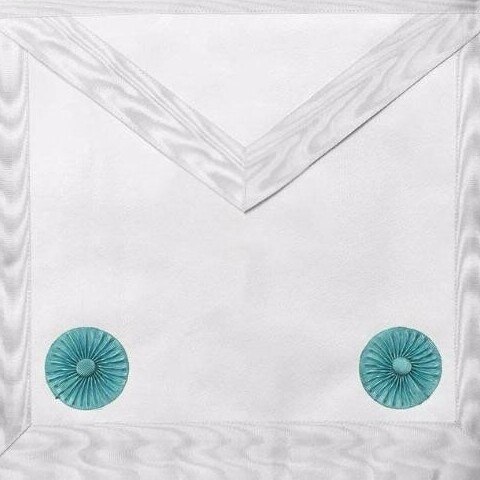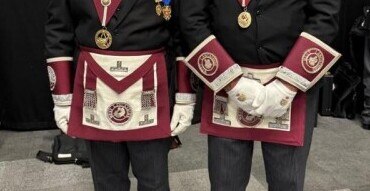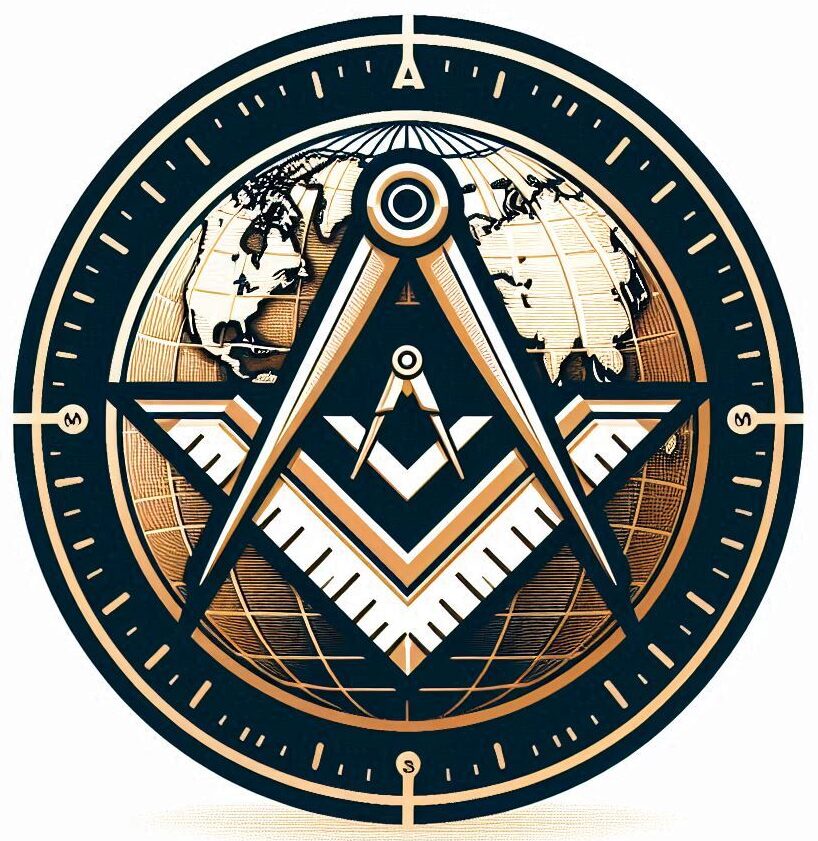Masonic aprons have deep-seated roots going back centuries. Originating from the stonemasons of the middle ages, these aprons were practical work garments, protecting workers as they crafted magnificent structures. Over time, as Freemasonry transitioned from operative to speculative, the apron remained as a symbol of a Mason’s bond to his operative past. It’s fascinating how these garments have evolved into emblems of honour and symbolism we see today.

An apron for a Fellowcraft Freemason
The Masonic apron is not just a piece of attire; it’s deeply emblematic. Worn during lodge meetings and rituals, it represents purity of soul and a commitment to the path of Freemasonry. This isn’t about putting on any old apron – it’s a badge that signifies a Mason’s dedication and alignment with the foundational principles of brotherly love, relief, and truth. The design of each apron, tailored to specific degrees, underscores these values, showing a Mason’s progress and achievements.
Vibrant colours and intricate designs on Masonic aprons are far more significant than their aesthetic appeal. For instance, blue, a primary colour in many apron designs, signifies loyalty and friendship. Gold and silver embroidery reflects wisdom and strength, respectively. The designs can vary between lodges but the underlying purpose remains, showcasing the individual’s journey and standing within the fraternity.
 An array of Provincial aprons on display
An array of Provincial aprons on display
The material of the apron plays an equally important role in its symbolism. Traditionally made from lambskin, which represents innocence and purity, aprons today may incorporate materials like silk for added dignity. This choice reflects the Masonic ideals of striving for perfection and maintaining humility, echoing the roots of craftsmanship where quality and integrity were paramount.
Masonic aprons aren’t just decorative. During rituals, aprons serve as reminders of the moral and ethical teachings espoused within the Masonic order. From new initiates to seasoned masters, every member dons their apron as a sign of learning, introspection, and the continuous journey toward self-improvement. Each ritual is a re-enactment of the values the fraternity holds dear, with the apron symbolizing one’s personal dedication to living those values daily.
 Provincial Grand Stewards aprons differ in colour
Provincial Grand Stewards aprons differ in colour
While Masonic aprons hold specific meanings within the context of Freemasonry, they also carry a universal message. These aprons are symbols of fraternity, equality, and moral integrity. Through them, Freemasonry shares a timeless message of unity and shared human values, inviting all Masons to live by a standard of ethical conduct and mutual respect, encouraging personal growth and collective harmony.

Your article topic was intriguing as it explored the deep historical and symbolic significance of Masonic aprons, garments that originated as practical tools for medieval stonemasons and have since evolved into powerful symbols within Freemasonry. I was not really sure of what the Masons were but it does seem relevant today as symbols of personal integrity and moral growth, Masonic aprons reflect a Mason’s journey, values, and commitment to the fraternity’s enduring principles of brotherly love, truth, and self-improvement. This article reminds readers of the importance of tradition, purpose, and ethical living. I think those who would benefit most from this article include history enthusiasts, and anyone interested in symbolic traditions that inspire personal development and unity. What could be expanded on in more detail is the positive view emphasizing how the fraternity placed very high importance towards ethical living, purity, humility, integrity, and equality. With the apron as a badge of honour holding it’s students to higher principles ( we definitely need more of that today ). I believe the apron can stand as a symbol of personal growth especially through challenging times while acting as an anchor to keep us aligned to principles that benefit all.
Thank you for such a thoughtful and insightful response. I’m glad the article resonated with you and that it sparked an interest in the symbolic and ethical dimensions of Freemasonry, especially as embodied in the apron. You make an excellent point about expanding on the fraternity’s strong emphasis on ethical living, integrity, humility, and equality, these are indeed cornerstones of Masonic philosophy that could be highlighted further. I particularly appreciate your observation about the apron serving as an anchor during challenging times; that’s a very powerful metaphor. It reminds us that symbols like the apron aren’t just historical relics, but living emblems that can inspire us to strive for higher ideals in our daily lives. Thank you again for sharing your perspective as it adds real depth to the conversation.